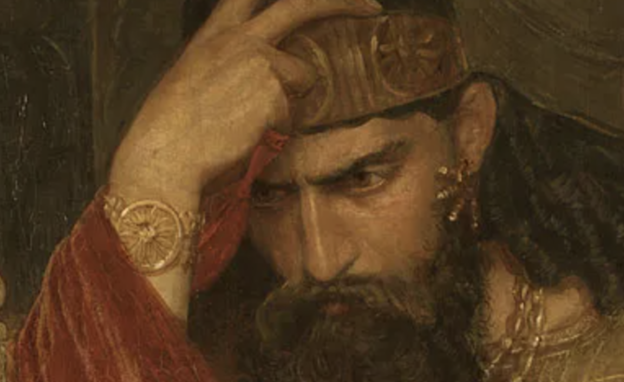We might like to think that we can escape the consequences of our actions forever, but when it comes to disobeying God the day of reckoning will always arrive. Whether in positions of power or not, disobeying God will always lead to our downfall.
For Saul, the day of his downfall had arrived. Sadly, Saul’s sin would see many others fall along with him, including his sons. However, this tragic episode also brought about the entry of faithful Jonathan to his heavenly reward, and an episode of bravery in the face of the world’s apparent victory which encourages us to stand firm, even in the face of apparent defeat. It also opened the door for a new, faithful king to rise.
While David had successfully rescued his wives and children from captivity, and even spread the bounty of victory around, the Philistines and Israel under Saul entered into battle. For Saul, the battle did not go as it did for David, because God was with David and was not with Saul.
While the Amalekites fled before David, “the men of Israel fled before the Philistines and fell slain on Mount Gilboa” (v.1). There is no sugar coating this episode; the battle was a disaster. The following verses bear out why.
Not only did a great many Israelites fall, but so too did Saul’s sons. “The Philistines overtook Saul and his sons, and the Philistines struck down Jonathan and Abinadab and Malchi-shua, the sons of Saul” (v.2).
Here was a tragedy. While we know little of Abinadab and Malchi-shua, we know Jonathan as a faithful servant of God and friend of David. A man who served his faithless father, and yet laid aside his claim to the throne, knowing that David was the appointed King after God’s own heart.
Yet Jonathan fell that day too. While Jonathan may have suffered loss of life due to his father’s many sins, his trust in God saw him enter the rule and reign of a better king in eternity.
The battle reached Saul, too, as he was targeted by Philistine archers, badly wounded (v.3). Recognising that if he was captured alive he would be abused and tormented by them (like Samson before), Saul sought escape by asking his armour-bearer to kill him (v.4).
Yet his armour-bearer, like David before, would not touch God’s Anointed, so Saul exercised “end of life choice” and fell on his sword rather than falling upon God’s mercy and strength at the last (v.5). Saul could not repent, he could only try and run away from his end. His armour-bearer followed suit (v.5).
When the Israelites saw that Saul, his sons, and many of the men in his army had died (v.6), they fled from the surrounding towns and areas to escape the rampage (v.7). In a reversal of the land promise God made to Israel, the Israelites fled before the Canaanites who drove them away.
The following day the Philistines picked their way through the corpses, looking for spoils (v.8). They found Saul and his sons, cut off Saul’s head and stripped off his armour, and sent good news to their cities and their pagan temples (v.9). King Saul had fallen! Their gods were victorious over Israel’s God (or so they thought). The armour went on display in Ashtaroth’s temple, and Saul’s body was hung on the wall of Beth-Shan to rub in their victory (v.10).
Yet even in this momentary triumph, not everyone lost hope. The residents of Jabesh-Gilead, remembering God’s past deliverance through Saul, came at night to remove Saul’s body and that of his sons, and give them a fitting burial (vv.11-13).
Following that, they mourned (v.13). The king had fallen, yes, but worse still God’s name was slandered among the Philistines. Saul’s sin had brought destruction to Israel, and his death caused Philistine joy at the “victory” of their “gods”. God’s People, fled and scattered. They were without a king, a shepherd to guide them.
Much as we do not wish to dwell on it, this passage reminds us that all who disobey God will meet their downfall. We must constantly repent of our sins and turn to Christ, seeking forgiveness and Christ’s righteousness as the only escape from the downfall we deserve.
But it also reminds us to look beyond the immediate to the eternal. Jonathan was caught up in his father’s downfall, despite his faithfulness to his father, to David, and to God. Yet for Jonathan, his death was his entry to a greater eternal glory. It reminds us that the tragic deaths of Christians, while indeed tragic, are also the beginning of something better. We do not mourn as those without hope.
Because while Israel at that point may have seemed without a shepherd, one was appointed. And we too have a shepherd who watches over us, even as we may courageously make small stands against the apparent victory of this world. One day, our own shepherd-king Jesus will ensure the downfall of all those who rebel against God.

